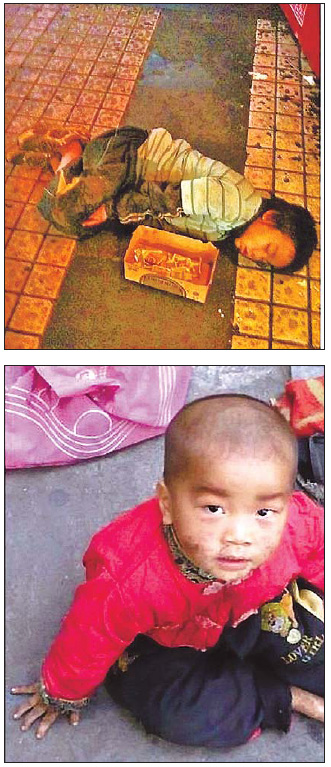Focus
Micro blogs save abducted children
Updated: 2011-02-15 07:52
By Li Li (China Daily)
|
|
The beneficiaries
"Without the micro blog, I probably wouldn't see my son again," Peng Gaofeng told China Daily, choking back sobs. The 33-year-old man found his abducted son through a micro blog, and the story has made headlines throughout China.
Peng lost his son, Lele, on March 25, 2008, when a stranger took the 3-year-old forcibly in front of Peng's grocery in Shenzhen. Six surveillance cameras caught images of the man escaping with Lele until they disappeared on a bus, but these clues didn't help Peng and the police track down the kidnapper.
"It is a crime more evil than murder," Peng said.
He put big posters outside his grocery and turned it into a working base for searching for his son. He said he tried working with the police, advertising in newspapers, handing out fliers, offering rewards, protesting on the street with other parents, writing blogs. These attempts attracted attention, but didn't lead to his son - until Deng Fei, a reporter for Phoenix Weekly, tweeted about it and attached Lele's photo.
Deng published this micro blog to his 110,000-plus followers, and it was quickly retweeted more than 5,000 times. Deng said he republished the message and photo on holidays, hoping someone could identify the boy.
Two days before Chinese New Year, a netizen who had seen Lele's picture found a child who looked just like him in Pizhou, Jiangsu province, and he contacted Peng immediately. A few days later, Peng traveled to Pizhou to see the boy. It was, indeed, his son. By that time, Lele had been living with the family that abducted him for three years.
"Everyone can be an investigator with the help of micro-blogging," Peng said.
Reporter Deng live-tweeted the reunion of Peng and his son on Feb 8 and uploaded the reunion video. By 3 pm on Feb 14, the video had been watched more than 470,000 times just on youku.com, one of China's most popular video websites.
An online sensation
Peng's story took the micro blog campaign to repress child begging and child trafficking to a new level. Everyone was talking about it, on and off the Internet. By 3 pm Monday, more than 760,000 messages about child begging were tweeted on Sina.com's micro blog. Netizens from various cities formed volunteer groups to help child beggars in their areas.
It was so widely discussed that the Ministry of Public Security responded.
"I will use micro-blogging to keep communicating with everyone," Chen Shiqu, director of the ministry's anti-trafficking office, said via his micro blog. "We welcome any crime clues on trafficking and we will carefully check and verify every piece of information."
In fact, the government has organized five major crackdowns on human trafficking since the 1990s. Two years ago, a national DNA database was founded to assist. Blood samples from parents of children reported missing and samples from children of unclear background were collected and stored for automatic matching.
Zhang Baoyan is one of the first people who suggested the database to the ministry. "So far, over 900 children and their parents were united under the help of the DNA database," said Zhang, director of a non-governmental website, Baby Come Home, which helps parents exchange information and search for missing children.
Inspired by the micro blog campaign and Peng's story, Zhang opened a micro blog account for her website a week ago to increase the exchange of information. More than 80,000 followers have been added.
"Every piece of new message or picture of missing children we put up to our micro blog gets retweeted continuously," Zhang said. "We are definitely going to rely more in our future work on micro blogs."
Differing views
Some netizens prefer to believe in the power of the Internet over the police when its comes to find missing children. Yi Xiwei said the child beggars she ran into Sunday in Chongqing were standing just 100 meters from a police patrol station.
"One child was begging and singing using a microphone, and they have been there for a few days," Yi said. "There's no way these police wouldn't have noticed. I think a better chance to attract attention for these children is on the Internet."
Some people argue that the campaign violates the children's right to control their own portraits (images). Some say the campaign has deprived beggars of their right of survival. And some fear the campaign might trigger traffickers' violence toward the children.
"Begging itself is already an action of exposing the children's portraits. And using children to beg is illegal," Professor Yu countered. "Our goal is to make people realize that, in a civilized world, children should be in school instead of begging on the street."
For Sun Haiyang, Peng's reunion with his son and the heated micro blog campaign are a huge encouragement. The 37-year-old man lost his son, also 3, in Shenzhen in 2008. He and 17 other parents used to be Peng's "searching partners". After hearing of Peng's success, Sun is now pouring all his energy into monitoring micro blogs and sleeping less than three hours a day, he said. Each similar picture or phone call from warmhearted friends makes his heart jump.
"Although it has all been false alarms so far, I believe the scope and amount of information on micro blogs will provide a bigger chance," Sun said. "Maybe one day I'll hear news about my boy from a phone call like Peng did, that simple."
Xing Zhengguang's outlook is not as bright. A 33-year-old Shaanxi farmer, he lost his 1-year-old son in 2009.
"I heard that the abducted child in Shenzhen has been found in the end," said Xing, whose family earns less than 1,000 yuan ($150) per month. "It is lucky that they own the privilege of finding their son using advanced computer technique, which is kept from us by overwhelming poverty."
Zhang Yuchen contributed to this story.
|
|
Specials

Spring Festival
The Spring Festival is the most important traditional festival for family reunions.

Top 10
A summary of the major events both inside and outside China.

A role model
Alimjan Halik had been selected as the "Cyberspace Personality Who Moved the Hearts of the Chinese in 2010".

